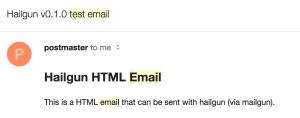The Hailgun library
Very recently I was writing a shared service in Haskell and we realised that we would need to integrate with an email service provider. After a little bit of research I concluded that Mailgun was a great service for developers to send their emails so I looked for Mailgun integration libraries that looked like they were being groomed to be “the” Mailgun library for Haskell and I was disappointed to find that the existing libraries did not seem to be very comprehensive or did not make use of type safety.
So I wrote my own library and I called it “Hailgun”. Then I uploaded it to Hackage.
I believe this library to be better because:
- It supports simple email sending just like the existing libraries.
- The type system is stricter, leaving less room for incorrect usage of the API. Giving you the assurance that you will be sending emails correctly.
- There is a backlog of issues that has been roadmapped such that the library will have full Mailgun API support. It just needs time to develop it.
- The support for the various parts of the API is being implimented and released incrementally so that people can get the benefits of the hailgun library now.
- It comes with the hailgun-send executable out of the box. This executable can be used on the command line to send emails through the Mailgun API.
- This library has been written in pure Haskell and does not use any FFI wrappers around another Mailgun library: the goal of this library is to work on any platform.
And this is just for version 0.1.0.0. To people that read this in the future, you should check out the library on hackage to see what it impiliments now.
Sending a test email
I’m going to explain here how to send a test email using hailgun-send so that you can quickly see that the library works and can be used to send your emails in pure Haskell code.
If you don’t have a Mailgun account and a sandbox for it then go sign up for one. Once you have created your account you should have been given an API key and have a sandbox domain name. Please create a file called ‘hailgun.send.conf’ in the current directory and make the contents of the file:
mailgun-domain = "sandbox-mailgun-domain.com"
mailgun-api-key = "key-thatmailgungaveme9234uoah234"Once you have that file in place you should then be able to use hailgun-send. For example, this is one invocation that I used:
hailgun-send
--from 'postmaster@sandbox17bd032a44ea44f5b540470a8ab4787f.mailgun.org'
--to 'robertmassaioli@massaioli.com'
--subject 'Hailgun v0.1.0 test email'
-x data/email.text
-m data/email.htmlYou will notice that I provided a from and to address, an email subject and the content of the email in two files. You should create the email.text and email.html files yourself or you could simply use the ones that are avaliable in the repository. Please note that the HTML version of the email is optional but the text version is always required.
You should see something like the following email appear in your inbox:

Concluding Words
In short you should now be able to send emails, via Mailgun, with Haskell and the library should be improved to have more API support as time goes by. I hope this is useful to some peoplee and, if a Mailgun developer should happen to swing by this post then please feel free to review my code.